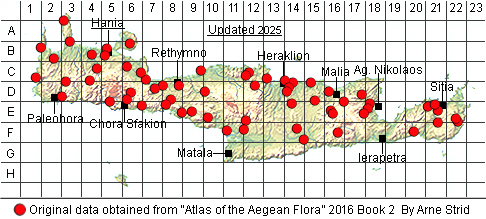SPECIES DESCRIPTION
RANUNCULUS MURICATUS
Family and Genus:- See- RANUNCULACEAE/Subgen. RANUNCULUS/Sect.
Common Names:- None
Homotypic Synonyms:- Ranunculus graecus
Meaning:- Ranunculus (L) Little-frog, diminutive of rana, (reference to the water-
loving habit of many species).
Muricatus (L) Rough with short superficial tubercles.
General description:- Glabrous or with sparse soft spreading hairs annual.
Stems:-
1) 1 to several, ascending to erect, 5-30 cm, rather thick and ± fistulose below,
sparingly branched.
Leaves:-
1) Basal, long-petiolate, the petiole dilated into a sheath below.
a) lamina, broadly triangular-ovate to suborbicular, generally 3-5 cm broad, 3-
partite to 60% or more, the
b) lobes, shallowly lobed or dentate, with broad, subobtuse teeth.
2) Cauline, similar to the basal ones but gradually more reduced.
Flowers:-
1) Few, small, solitary in the leaf axils and sometimes concealed by the upper
leaves.
2) Pedicel, shorter than or equalling the subtending leaf.
a) fruiting, straight, grooved or sulcate, not swollen.
3) Sepals, deflexed, 60% as long as the petals, pilose caducous.
4) Petals, 5-8 mm, narrowly obovate, obtuse, pale yellow,
5) Receptacle sparsely pilose.
Fruit:-
1) Achenes, strongly compressed.
a) head, globose;
b) body, 4(-5) x 3(-4) mm, muricate, c.1 mm long, medium brown, keeled, with a
smooth, greenish margin.
c) beak, c. 2.5 mm, falcate, greenish.
Key features:-
1) Body of the achene, 4(-5) x 3(-4) mm, strongly muricate with sharp projections
c.1 mm long, medium brown, keeled, with a smooth, greenish margin.
a) beak, c. 2.5 mm, falcate, greenish.
2) Receptacle, pubescent.
3) Sepals, deflexed.
4) Leaves, shallowly lobed.
5) Pedicel, grooved or sulcate.
Habitat:- Seasonally wet places, often on disturbed ground in meadows, fallow
fields, olive groves, open patches in scrubland vegetation, etc., on various
substrates, 0-700(-1100) m.
Distribution:- Widespread and common throughout the Mediterranean. Often
casual. One of the commonest buttercups in the Med region. Widespread and
common on Crete.
Flowering time:- Mostly late Mar to mid-May.
Photos by:- Fotis Samaritakis
